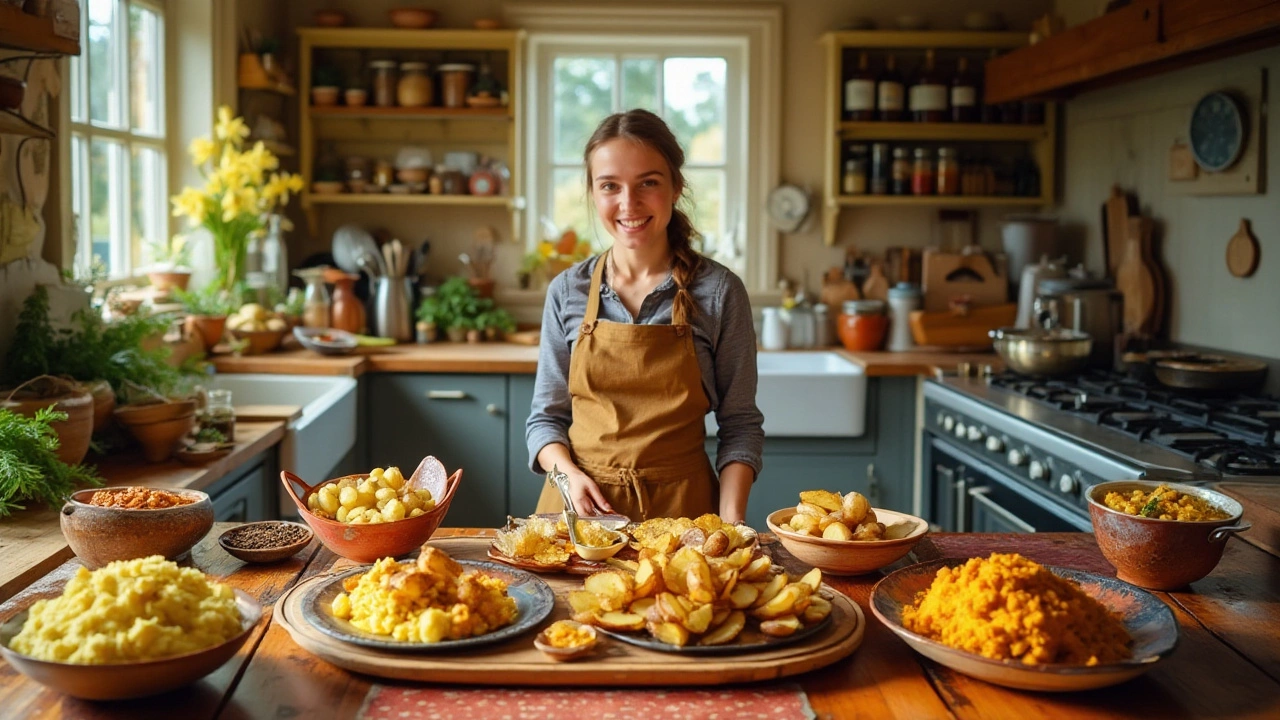When it comes to staples in the plant-based diet, potatoes usually top the list. But have you ever wondered if vegans can really eat potatoes? Let's dig into the details and discover how this humble root vegetable fits perfectly into a vegan lifestyle.
Packed with essential nutrients, potatoes are not only versatile but also incredibly satisfying. Whether you're mashing, baking, or roasting them, there's no denying their appeal in vegan cuisine. In this article, we'll explore the vegan status of potatoes and share some creative ways to incorporate them into your meals.
Join us as we peel back the layers of this popular vegetable, offering insights into its health benefits and practical cooking tips to elevate your vegan culinary creations. Get ready to revolutionize your meals with these delightful potato inclusions!
- Are Potatoes Vegan?
- Nutritional Benefits of Potatoes
- Creative Vegan Potato Recipes
- Cooking Tips for Vegan Potatoes
Are Potatoes Vegan?
When pondering a plant-based diet, the question of whether vegan potatoes fit the bill might not cross many minds. Potatoes, by their very nature, are unequivocally vegan. They are a root vegetable, growing beneath the earth, and free from any animal-derived components. The plant itself belongs to the nightshade family, sharing genetic ties with tomatoes and eggplants. Its composition, essentially water and carbohydrates, marks potatoes as an excellent candidate for fulfilling vegan dietary needs.
One might ask how something so universally regarded as harmless could raise doubts. The issue often arises not from the potato itself, but from how it is prepared. Many popular potato dishes, especially those that are restaurant-prepared or pre-packaged, include non-vegan toppings and ingredients. For instance, classic mash often features butter and cream, both dairy products, making it unsuitable for a vegan diet. Similarly, French fries can be cooked in animal fat, though more establishments are now shifting towards vegetable oil due to health and ethical considerations. Hence, while potatoes in essence are vegan, vigilance in preparation is key.
In the cultural fabric, potatoes have long been celebrated across various cuisines. They offer a blank canvas for creativity and can stand alone in simple preparations or complement an elaborate dish. Adopting a vegan approach means exploring flavors while respecting the boundaries of a plant-based diet.
"Potatoes are like blank sheets of paper when it comes to cooking," says renowned chef and food writer Alice Waters. "The possibilities with herbs, spices, and plant-based proteins are endless."Her words underscore the adaptable nature of potatoes, highlighting both their versatility and the culinary opportunities they present to vegan enthusiasts.
For those considering their nutritional content, potatoes provide key dietary fibers, essential vitamins, and minerals. They are rich in Vitamin C, a potent antioxidant, and potassium, which supports cardiovascular health. What many might not realize is that potatoes also contain smaller amounts of protein, typically more than one gram per medium potato. This helps support a balanced and varied vegan diet when combined with other plant-based foods. Since potatoes are naturally low in fat and calories, they make for a nourishing addition without compromising health goals.
Navigating through vegan labeling, it pays to be an informed consumer. Checking the ingredient list on packaged potato products is a good practice, as recipes riddled with hidden animal derivatives could affect dietary choices. Staying aware and choosing whole potatoes can assure one of a true vegan-friendly decision. Whether boiling, baking, or frying, the goal remains clear: stay simple, emphasize natural flavors, and, most importantly, relish the comforting sustenance of dishes built around the beloved potato.
Embrace this knowledge and let potatoes find their rightful place in your repertoire of vegan recipes. Armed with understanding, natural sauces, seasoning mixes, or even olive oil can enhance their taste without compromising vegan principles. As with any vegan endeavor, creativity is not just encouraged—it's essential. Go ahead and let the potato shine brightly on your vegan plate.

Nutritional Benefits of Potatoes
Potatoes are much more than just a comfort food; they're a powerhouse of nutrition that can be a valuable addition to any vegan meal. Often misunderstood as merely a source of carbohydrates, potatoes are actually rich in essential vitamins, minerals, and dietary fiber. One medium potato provides a substantial amount of vitamin C, a powerful antioxidant that helps in boosting the immune system and maintaining the elasticity of the skin. In fact, a single potato contains nearly 30% of the daily recommended intake of vitamin C, which illustrates just how nutritious potatoes can be.
In addition to vitamin C, potatoes are a good source of vitamin B6, which is crucial for brain health and the formation of neurotransmitters. For those following a vegan diet, potatoes offer an affordable source of complex carbohydrates and energy without the cholesterol found in animal-based foods. They contain potassium as well, which is essential for maintaining healthy blood pressure levels. A medium potato provides more potassium than a banana, offering a seemingly unexpected benefit. Dietary fiber found in potatoes supports digestive health and can aid in weight management by providing a satisfying sense of fullness.
According to The World's Healthiest Foods, "Potatoes are one of the best sources of vitamin B6 available, providing almost 10 percent of the recommended daily dose."
Potatoes also contain antioxidants such as flavonoids and carotenoids, which can help to fight free radicals in the body and reduce the risk of chronic diseases. These compounds contribute to the vibrant colors seen in different potato varieties, with each color hinting at the presence of different health-boosting phytonutrients. For those interested in consuming more nutrient-dense foods, incorporating the variety of potatoes available—such as red, purple, and yellow—can be a delightful and nutritious choice. Eating the skin can amplify intake of fiber and other nutrients, turning an already healthy food into a nutritional supernova.
Including potatoes as a regular part of your diet can thus not only satisfy your taste buds, but also support your overall health with their multitude of benefits. And don't forget, due to their versatility, potatoes can be easily integrated into many vegan recipes, allowing you to enjoy their nutritional benefits no matter how you prefer them - roasted, mashed, or baked.

Creative Vegan Potato Recipes
Potatoes have long been celebrated not just for their ability to fill a plate, but for the myriad ways they can be transformed into delectable dishes. Their versatility is unparalleled, and when it comes to vegan recipes, potatoes really are the stars of the show. This section dives into some of the most imaginative and mouth-watering ways to enjoy potatoes, all while sticking to a plant-based diet.
One classic that never disappoints is vegan mashed potatoes. The trick is in the details — using plant-based milk and vegan butter to get that creamy, rich texture. Adding roasted garlic and a sprinkle of nutritional yeast can elevate this dish to new heights. For a hint of freshness, consider folding in finely chopped chives or parsley right before serving. Not only does this add color, but the fresh herbs provide a burst of flavor that pairs beautifully with the smooth, buttery potatoes.
Looking for something with a bit more crunch? How about some sweet potato wedges, seasoned and baked to perfection? Plant-based diet enthusiasts rave about how these satisfyingly crispy edges contrast with their soft, rich interiors. A simple seasoning mix of paprika, garlic powder, and a touch of cayenne pepper can transform these wedges into a flavor-packed snack or side dish. Served with a homemade, tangy vegan aioli, these wedges can quickly become a staple in your kitchen.
"Potatoes offer a fantastic base for any meal and are a wonderful example of how plant-based foods can be both filling and versatile," says renowned vegan chef Isa Chandra Moskowitz. She emphasizes that creativity is the key to discovering new flavors and textures in vegan cooking.
Another delightful dish is the vegan potato salad, a perfect addition to any picnic or barbecue. Swapping out the traditional mayonnaise for a rich avocado dressing not only makes this dish vegan but also introduces a pleasing creamy texture and mild flavor. Mix in some Dijon mustard, lemon juice, and capers for depth, along with diced celery and red onions for crunch. This salad is a great way to showcase the humble potato in a refreshing, bright, and flavorful manner.
If you're in search of something a bit more exotic, consider trying potato curry, where potatoes are simmered in a fragrant blend of spices, coconut milk, and vegetables. Not only does this dish highlight the incredible adaptability of potatoes, but it also offers a comforting meal that's brimming with flavors. This is where you can really play with your palette; consider adding chickpeas or lentils for an even heartier dish or tofu for added protein to cater to the plant-based diet.
For a twist on breakfast, why not try a vegan potato hash? Diced potatoes are sautéed with colorful bell peppers, onions, and herbs. Top it off with avocado slices and a sprinkle of nutritional yeast or hemp seeds for that extra kick. The beauty of potato hash lies in its flexibility and how it can be adapted to whatever vegetables and seasonings you have on hand.
In the realm of vegan cooking, potatoes undeniably stand out as a mainstay ingredient capable of transcending traditional culinary boundaries. Whether mashed, baked, or wedged, they are cherished for their adaptability and flavor. So, get creative in your kitchen and discover the countless ways vegan potatoes can enhance your meals, allowing you to enjoy not only their comforting taste but also their impressive nutritional profile.

Cooking Tips for Vegan Potatoes
Potatoes are a beloved part of the vegan recipes world, bringing their unique texture and flavor to countless dishes. Whether you're aiming for silky smooth mashed potatoes or crispy roasted slices, the technique is key. One golden rule is to always select the right type of potato for your dish. For instance, russets work beautifully for mashing due to their high starch content, while Yukon Golds hold their shape well and have a naturally buttery flavor, making them perfect for roasting or salads.
When boiling potatoes, starting with cold water instead of dropping them into boiling water ensures they cook evenly. This might seem trivial, but it prevents the outside from becoming mushy before the inside is tender. Additionally, don't underestimate the importance of seasoning your cooking water. A generous handful of salt in the water can lead to a more deeply flavored potato, which can be crucial when crafting a simple plant-based diet meal.
Roasting is another popular method, and the trick to achieving that perfect crunch is in the prep. After cutting your potatoes into even pieces, soak them in cold water to remove excess starch. This helps in achieving that coveted crispiness. Drying them thoroughly before seasoning is also crucial. Toss them with olive oil and your choice of spices – garlic powder, paprika, and rosemary are classics.
"The key to good potato cooking is in the details," says Terry Romero, a respected vegan chef and cookbook author. "Spending a little extra time on preparation can make all the difference in the final dish."
Panfrying is another fantastic technique for quick and flavorful dinners. Start by heating a well-sized non-stick skillet over medium heat. Add a touch of oil, then place the potatoes cut-side down to sear. Once browned, flip to the other side, adding any extra seasonings or a splash of vegetable broth for some steam and moisture.
If you're a fan of potato soups in your vegan potatoes ventures, remember that blending potatoes after boiling can create a velvety texture. Adding non-dairy milk or a bit of nutritional yeast can boost flavor without compromising on vegan values. Leverage herbs like thyme and bay leaves during cooking to infuse aromatic depth.
For those eco-conscious home chefs, consider cooking your potatoes with the skin on to retain most of their nutrients and minimize food waste. The skin's earthy taste complements many dishes and adds a healthy amount of fiber to your meal plan.

